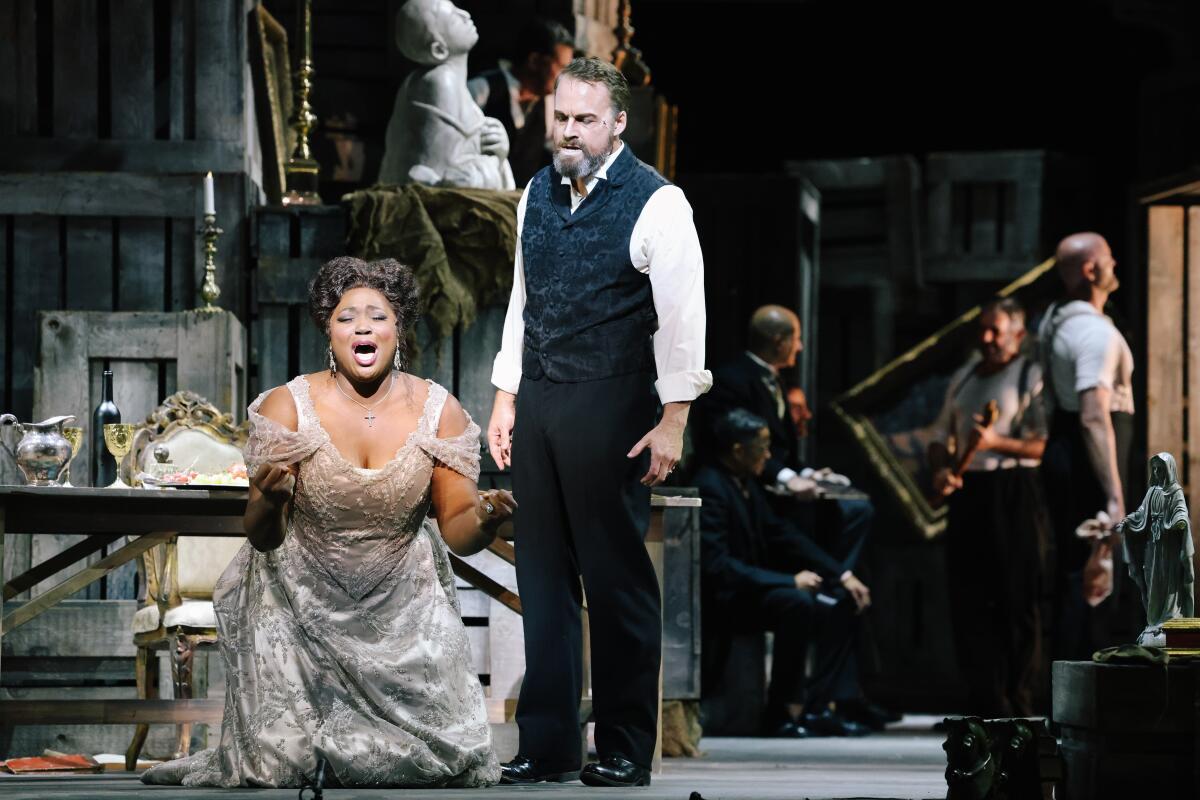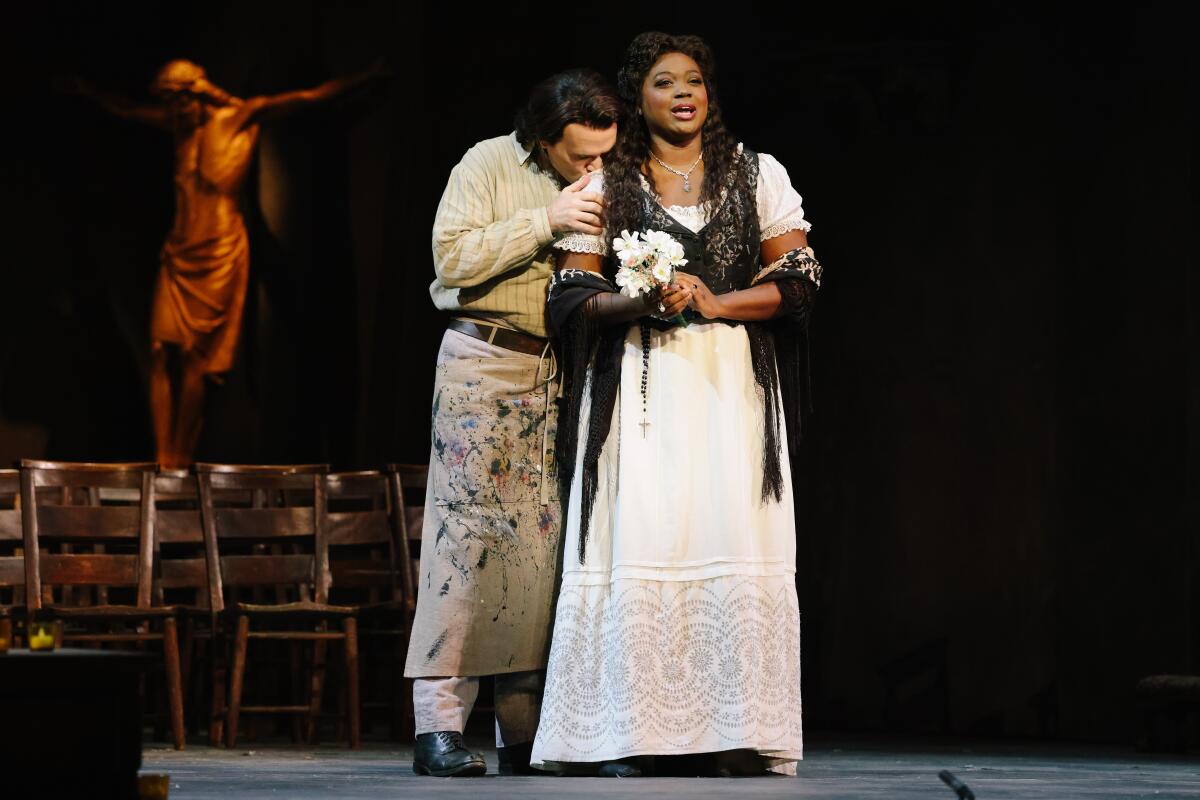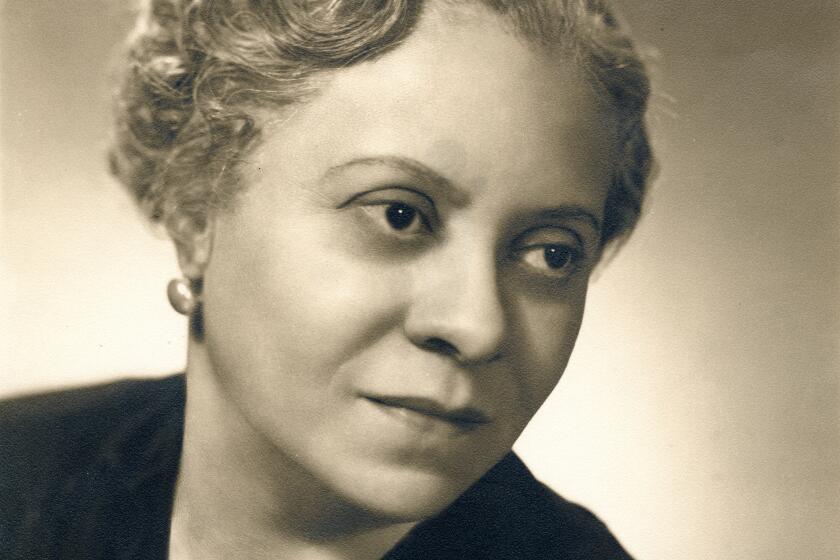Review: An L.A. Opera ‘Tosca’ that’s more than it seems

“Tosca” is back at Los Angeles Opera. The well-traveled production by British director John Caird, first seen here in 2013, has been revived. The cast, headed by popular Los Angeles native Angel Blue, as well as the conductor and production team are nearly all familiar. Saturday night’s performance at the Dorothy Chandler Pavilion, the first of six through Dec. 10, was impressively sung if theatrically conventional. The needle on the meter that measures how much the art form of opera might have moved forward this evening didn’t budge.
The audience was dressed well, some even flamboyantly. The line at the intermission bar, where a drink and a bag of potato chips along with tip could cost nearly as much as the cheapest seat, was long. It was, in what might be the dismissive public imagination, an elitist night at the opera. As if he had just such a “Tosca” in mind, the head of the Arts Council England, Darren Henley, defending the recent defunding of business-as-usual opera in Britain, made the withering suggestion last week that what is needed to make opera modern and accessible is to take it out of the opera house and bring it to the people in their pubs and car parks. Otherwise, the art form will die.
For the record:
10:30 a.m. Nov. 23, 2022An earlier version of this article misstated the title of a Du Yun opera. The correct title is “In Our Daughter’s Eyes,” not “Everything Rises.”
Maybe the needle did, in fact, move Saturday, but not in the direction that Henley was talking about. I can’t imagine anyone wanting to stick around in the underground Music Center garage and have opera brought to their cars. As for pubs, I have a feeling they don’t want opera any more than opera wants them.
What struck me Saturday night was the sheer pleasure the audience took in being in an opera house for an opera, in being in a world that felt, for three hours, like a welcome refuge from the ordinary.
The classical world has been championing Black composers Florence Price and Margaret Bonds, but the L.A. Phil goes further.
And wait a minute, that seat that cost the price of a drink and small snack happened to be $27, and it is in the top balcony where the acoustics are often the best. Reporting from Las Vegas the other day, my colleague Mikael Wood noted that the cheapest seat to hear Adele in what is considered an intimate space for pop music, a theater with 1,000 more seats than the already-too-large Dorothy Chandler, was $800, double the top price for “Tosca.” Reports are circulating that a single seat in the inhumanly humongous SoFi Stadium for the last night of Taylor Swift’s appearances next summer could buy you an entire balcony at the Chandler.
Maybe the more intriguing question at this “Tosca” was: How much does operatic progress matter? L.A. Opera is not oblivious to new, relevant and challenging work. Earlier this year, the company boldly presented Bach’s “St. Matthew Passion” from the Hamburg Ballet, and it premiered the pertinent new opera “In Our Daughter’s Eyes” by Du Yun. Last month, it offered the West Coast premiere of “Omar.”
Puccini’s “Tosca,” written in 1900, can be meaningful modern theater as well, with its vivid representation of political oppression and sexual abuse. A creepy Dutch National Opera production by director Barrie Kosky, which can be watched on medici.tv, is so disturbing that it is almost guaranteed to make the hair on the back of your neck stand up.
Caird’s “Tosca,” however, takes no risks. When it was first seen here, the takeaway was that you should come for the singing, not the staging. That still holds despite the fact that the three leading singers have been shown to be talented actors. The main draw is Angel Blue, who already attracted attention as a student at UCLA and as someone coming up through the ranks at L.A. Opera. Now an international star, she returns to L.A. for her first starring role with the company.
In director Christophe Honoré’s startlingly original production of Puccini’s opera at the 2019 Aix-en-Provence Festival, Blue starred as a young singer learning the role and captured the audience’s imagination in a new and moving way. This time, though, she is given little opportunity to create a character. Her movements are unnatural. She is there to sing, leaving it to the music to carry the drama. She pours her heart out in the opera’s most famous aria, “Vissi d’Arte,” a plaint against the world in which she gave her all to art and humanity only to find herself in the clutches of lecherous, merciless Scarpia, chief of police in early 19th century Rome. That she sings magnificently is all that matters.

Michael Fabiano shows himself as a characteristically vibrant tenor but uncharacteristically wooden Cavaradossi. Ryan McKinny — another L.A. native who has been impressive in modern opera (be it André Previn’s “A Streetcar Named Desire” or John Adams’ “Doctor Atomic” and “Girls of the Golden West”) — is here asked to be a suave, elegant monster, a Scarpia who, like many sexual predators, is not in it for the sex but the conquest. Puccini, however, was in it for the sex.
All of this takes place on an impressively imposing war-torn set, further dwarfing action. The smaller roles are well handled. Deepa Johnny stands out as a particularly lovely voiced shepherd.
Health issues forced the cancellation of the exciting Ukrainian conductor Oksana Lyniv, who was to have made her L.A. Opera debut. Louis Lohraseb, an up-and-coming young conductor who had conducted the L.A. Opera Halloween screening of “Psycho” with live orchestra three years ago, encouraged a robust sound from the instrumentalists and appeared attuned more to serving the singers’ need than propelling the drama.
Is that enough? Nine years ago, that might not have been. The world has changed. “Tosca” may have become more relevant, but we have also in our bombardment with relevance become more in need of beauty for its own sake. An audience that attended the performance enraptured and showed exuberant appreciation is to be thanked for the reminder. I wish, for the sake of the survival of opera as an art form, Henley and his condescending arts council could have been there to witness that the Music Center garage actually was not the attraction, but rather a place from which to escape.
L.A. Opera’s ‘Tosca’
Where: Dorothy Chandler Pavilion, 135 N. Grand Ave., L.A.
When: 2 p.m. Sunday and Dec. 4; 7:30 p.m. Dec. 1, 7 and 10. (Gregory Kunde is Cavaradossi Dec. 7 and 10)
Tickets: $27-$399
Info: (213) 972-8001 or laopera.org
Running time: 2 hours, 45 minutes
More to Read
The biggest entertainment stories
Get our big stories about Hollywood, film, television, music, arts, culture and more right in your inbox as soon as they publish.
You may occasionally receive promotional content from the Los Angeles Times.












